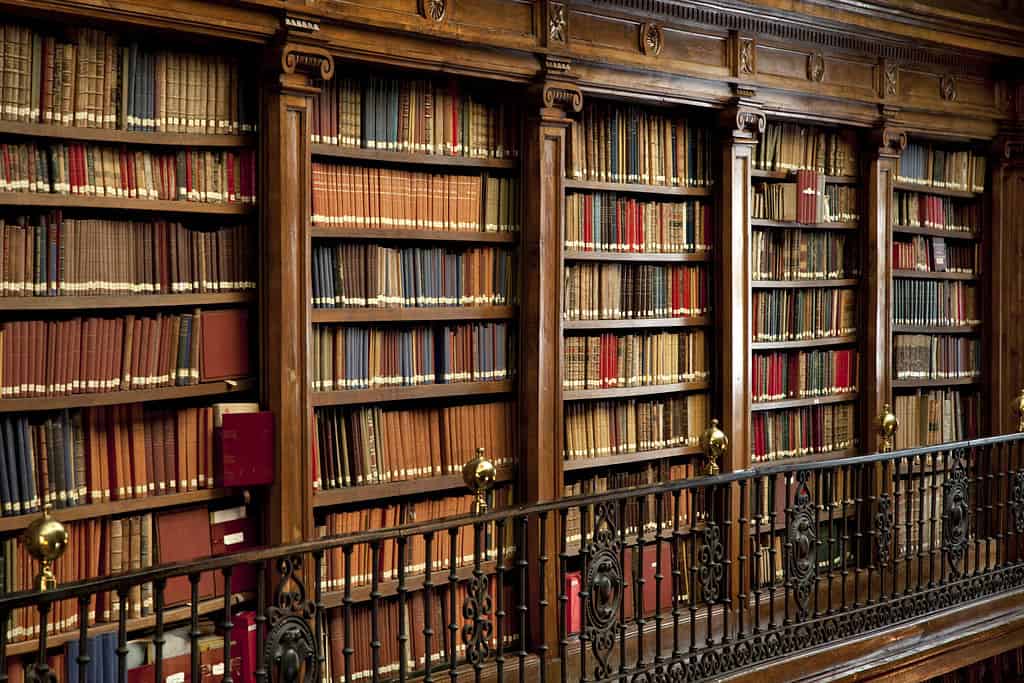Nestled within the historic city of Fez, Morocco, lies the venerable University of Al Quaraouiyine, often spelled Al Quaraouiyine or Al-Karaouine. It is the oldest existing degree-granting educational institution globally, with a storied history that dates back to 859 AD.
A Foundation of Faith and Learning
The determined and visionary Fatima al-Fihri, whose family had migrated from the city of Kairouan (hence the university’s name) in present-day Tunisia, founded this institution. Initially, the institution was a center of learning and a place of worship. It began its journey as a mosque with a madrasa (school) attached. This combination of religious devotion and a quest for knowledge reflects the harmonious coexistence of faith and scholarship.

The history of the University of Al Quaraouiyine is a testament to the enduring nature of the human pursuit of enlightenment.
©Momed.salhi, CC BY-SA 4.0 , via Wikimedia Commons – Original / License
A Treasure Trove of Knowledge
What distinguishes the University of Al Quaraouiyine is not only its age but also its continued operation throughout the centuries. It serves as a symbol of enduring knowledge and cultural preservation. The university’s historical significance extends far beyond Morocco. Its contributions to education, culture, and the preservation of knowledge have had a profound impact.
One of the university’s claims to fame is its impressive library, which houses a vast collection of manuscripts and books. Among the invaluable texts preserved here are ancient manuscripts that have made significant contributions to various fields of study.
A Testament to Human Progress
The history of the University of Al Quaraouiyine is a testament to the enduring nature of human curiosity and the pursuit of enlightenment. As it stands in the modern era, it is a reminder of the role that education and scholarship play in shaping our world. The university’s ability to adapt to the changing tides of history while preserving its core values is a source of inspiration for scholars and thinkers worldwide. Its longevity and the contributions of its distinguished alumni emphasize the timeless power of education and the pursuit of knowledge.
The Incredible Alumni
Throughout the centuries, the University of Al Quaraouiyine has nurtured the intellects of many extraordinary individuals who went on to make significant contributions to society. Here are some of the university’s most famous alumni.
Ibn Khaldun (1332-1406)
Ibn Khaldun was a renowned North African historian, philosopher, and scholar. He is considered one of the most influential figures in the fields of history, sociology, and economics during the medieval period. Born in Tunis, which is part of present-day Tunisia, in 1332, Ibn Khaldun is associated with the University of Al Quaraouiyine.
Ibn Khaldun’s most notable work is his historical treatise “The Muqaddimah” or “Prolegomena.” In this work, he laid the groundwork for the philosophy of history and the sociological study of human societies. “The Muqaddimah” explores various aspects of human civilization, including the rise and fall of empires, social cohesion, cultural developments, and the cyclical patterns of history.
Furthermore, his approach to history was unique for its time, emphasizing empirical evidence and critical analysis of historical events. Importantly, he introduced concepts like asabiyyah. This referred to the group solidarity or social cohesion that he believed was integral to the success of any society. This notion laid the foundation for the study of sociology.
Ibn Khaldun’s contributions to scholarship have had a lasting impact on numerous fields. What’s more, he is often regarded as one of the founding figures of sociology and historiography. His association with the University of Al Quaraouiyine is a testament to the rich history of learning and intellectual pursuits within the institution.
Maimonides (1138-1204)
Maimonides, also known as Rabbi Moses ben Maimon, was a highly influential Jewish philosopher, theologian, and physician. He is considered one of the most significant figures in Jewish intellectual history. Born in 1138 in Córdoba, Spain, Maimonides was a prominent alumnus of the University of Al Quaraouiyine.
He is best known for his comprehensive work in Jewish law and philosophy, particularly his “Mishneh Torah” and “Guide for the Perplexed.” These writings addressed topics ranging from ethics and theology to legal principles within Judaism.
Maimonides’ contributions extended beyond the Jewish community; he is celebrated for his contributions to the broader fields of philosophy and medicine. His works, especially “The Guide for the Perplexed,” explored the relationship between faith and reason. In addition, it reconciled Jewish religious traditions with Aristotelian philosophy.
Furthermore, as a physician, Maimonides was highly regarded for his medical knowledge and service. His medical treatises, including “Kitab al-Fusul” (Aphorisms) and “Kitab al-Tadbi’ (The Regimen of Health), became influential in the Islamic and European medical traditions.
Maimonides’ association with the University of Al Quaraouiyine underscores the institution’s historical significance as a center of intellectual exchange in the medieval world. His diverse contributions to philosophy, theology, and medicine continue to be studied and celebrated to this day.
Ibn Al-Haytham (965-1040)
Ibn al-Haytham, also known as Alhazen in Latin, was a highly influential Arab scientist, mathematician, and polymath who was an alumnus of the University of Al Quaraouiyine. He was born in Basra, Iraq, in 965 and lived during the Islamic Golden Age.
Ibn al-Haytham is best known for his groundbreaking work in the field of optics. His most famous work, “Kitab al-Manazir” (The Book of Optics), laid the foundations for the modern understanding of optics and vision. In this work, he challenged the prevailing theories of vision proposed by the ancient Greeks. In addition, it introduced the concept that vision is the result of light rays entering the eye. He also explored the principles of reflection and refraction. These played a crucial role in the development of lenses and the design of optical instruments.
Ibn al-Haytham‘s work significantly influenced later scientists and thinkers, including Roger Bacon and Johannes Kepler. He is often referred to as the “father of optics” for his pioneering contributions to the field.
In addition to optics, Ibn al-Haytham made important contributions to mathematics, astronomy, and other scientific disciplines. His work profoundly impacted the development of the scientific method and the progress of science during the Middle Ages.
As an alumnus of the University of Al Quaraouiyine, Ibn al-Haytham’s association with the institution underscores its historical role as a center of learning during that period. His contributions continue to be celebrated and studied in various scientific and academic fields.
Averroes (1126-1198)
Averroes, also known as Ibn Rushd, was a renowned philosopher, scholar, and polymath associated with the university. Born in Cordova, Spain, in 1126, he offered the world significant contributions to Islamic philosophy, theology, jurisprudence, and medicine, among others.
Averroes contributed extensive commentaries on the works of the ancient Greek philosopher Aristotle. His commentaries on Aristotle’s writings played a vital role in transmitting Aristotle’s philosophy to the Western world. Moreover, they became influential in the development of scholastic philosophy in medieval Europe. Averroes’ interpretations of Aristotle’s ideas helped shape the later works of prominent Christian scholastic philosophers such as Thomas Aquinas.
Furthermore, in the realm of philosophy, Averroes contributed the key philosophy of “double truth.” He believed that philosophy and religion could sometimes yield differing truths. Furthermore, he thought that they should coexist harmoniously, each addressing different aspects of human life and knowledge.
His contributions extended to medicine and jurisprudence as well. Averroes wrote extensively on these subjects and made notable advancements in the fields. His work in medicine, in particular, significantly impacted later medical practices in Europe.
All in all, Averroes’ association with the University of Al Quaraouiyine highlights the institution’s significance as a center of intellectual inquiry during the Middle Ages. The scholar’s contributions to various fields continue to be studied and revered in the realms of philosophy, science, and theology.
Conclusion
Finally, the University of Al Quaraouiyine continues to thrive in the 21st century. Its offerings span a wide spectrum of academic disciplines, including theology, science, mathematics, and literature. The institution has a rich history. Combined with the remarkable achievements of its notable alumni, it exemplifies the enduring value of scholarship in shaping our world.
As we delve into the annals of history and knowledge, the University of Al Quaraouiyine shines as a testament to human curiosity, intellect, and the pursuit of progress. Its dedication to education and the extraordinary contributions of its esteemed alumni serve as an inspiration to generations of scholars and thinkers worldwide. This oldest college in the world remains an unwavering beacon of enlightenment. Furthermore, its distinguished alumni roster attests to the enduring power of education.

The University of Al Quaraouiyine’s shines as a testament to human curiosity, intellect, and the pursuit of progress.
©Manuel Alvarez/Shutterstock.com
Thank you for reading! Have some feedback for us? Contact the AZ Animals editorial team.








